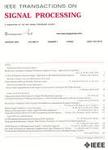版权所有:内蒙古大学图书馆 技术提供:维普资讯• 智图
内蒙古自治区呼和浩特市赛罕区大学西街235号 邮编: 010021

作者机构:Princeton Univ Dept Elect Engn Princeton NJ 08544 USA
出 版 物:《IEEE TRANSACTIONS ON SIGNAL PROCESSING》 (IEEE Trans Signal Process)
年 卷 期:2005年第53卷第12期
页 面:4661-4674页
核心收录:
基 金:Ministry of Education and Science MES
主 题:convex optimization theory linear precoder majorization theory multicarrier transceiver multiple-input-multiple-output (MIMO) channel primal decomposition technique Schur convexity waterfilling
摘 要:The design of linear transceivers for multiple-input-multiple-output (MIMO) communication systems with channel state information is particularly challenging for two main reasons. First, since several substreams are established through the MIMO channel, it is not even clear how the quality of the system should be measured. Second, once a cost function has been chosen to measure the quality, the optimization of the system according to such criterion is generally difficult due to the nonconvexity of the problem. Recent results have solved the problem for the wide family of Schur-concave/convex functions, resulting in simple closed-form solutions when the system is modeled as a single MIMO channel. However, with several MIMO channels (such as in multi-antenna multicarrier systems), the solution is generally more involved, leading. in some cases to the need to employ general-purpose interior-point methods. This problem is specifically addressed in this paper by combining the closed-form solutions for single MIMO channels with a primal decomposition approach, resulting in a simple and efficient method for multiple MIMO channels. The extension to functions that are not Schur-concave/convex is also briefly considered, relating the present work with a recently proposed method to minimize the average bit error rate (BER) of the system.